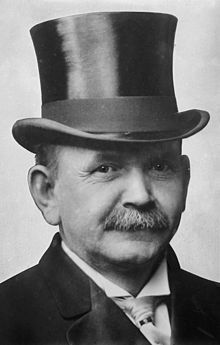Austin L. Crothers
| Austin L. Crothers | |
|---|---|
 |
|
| 46th Governor of Maryland | |
|
In office January 8, 1908 – January 10, 1912 |
|
| Preceded by | Edwin Warfield |
| Succeeded by | Phillips L. Goldsborough |
| Member of the Maryland House of Delegates | |
|
In office 1897–1900 |
|
| Personal details | |
| Born |
May 17, 1860 Conowingo, Maryland |
| Died | May 25, 1912 (aged 52) Elkton, Maryland |
| Political party | Democratic |
Austin Lane Crothers (May 17, 1860 – May 25, 1912), a member of the United States Democratic Party, was the 46th Governor of Maryland in the United States from 1908 to 1912.
Crothers was born near Conowingo in Cecil County, Maryland, the eighth son of Alpheus and Margaret Crothers. He was raised on his father's farm, spending much of his life there. Educated at West Nottingham Academy, he spent several years in the work force, first as a store clerk, then as a public school teacher. He was inspired to become a lawyer, and graduated from the University of Maryland Law School in 1890. He practiced law in Elkton until becoming the State's Attorney for Cecil County, a post he held from 1891 to 1895.
In 1897, Austin Crothers was elected to the Maryland State Senate as a Democrat, replacing his brother Charles C. Crothers. During the session of 1900, he became his party's leader in the Senate after becoming chairman of the Senate Finance Committee. He was re-nominated for the 1901 election, but was defeated by the Republican Henry M. McCullough. Crothers continued to act as party leader in Cecil County, but still failed another re-election attempt in 1905.
In 1906, Governor Edwin Warfield appointed Crothers to succeed the late Judge Edwin H. Brown as an associate judge for the Second Judicial Circuit, which included Cecil County. However, he refused to run for a second term, and instead ran for governor in 1907. Despite being a relative unknown, Crothers was elected into office.
Crothers' tenure as governor was notable for its reform aspects. He created the State Roads Commission in 1908 to improve Maryland's road system; he pushed through a Corrupt Practices Act to create more accountability for campaign funds; and he supported the direct election of U.S. Senators (though that actually passed into law after his term). Crothers also pushed for the creation of the Public Service Commission and the State Bank Commissioner. He supported pure food laws, better care for the mentally ill, and increased taxes for collateral inheritance and automobile licenses.
...
Wikipedia
